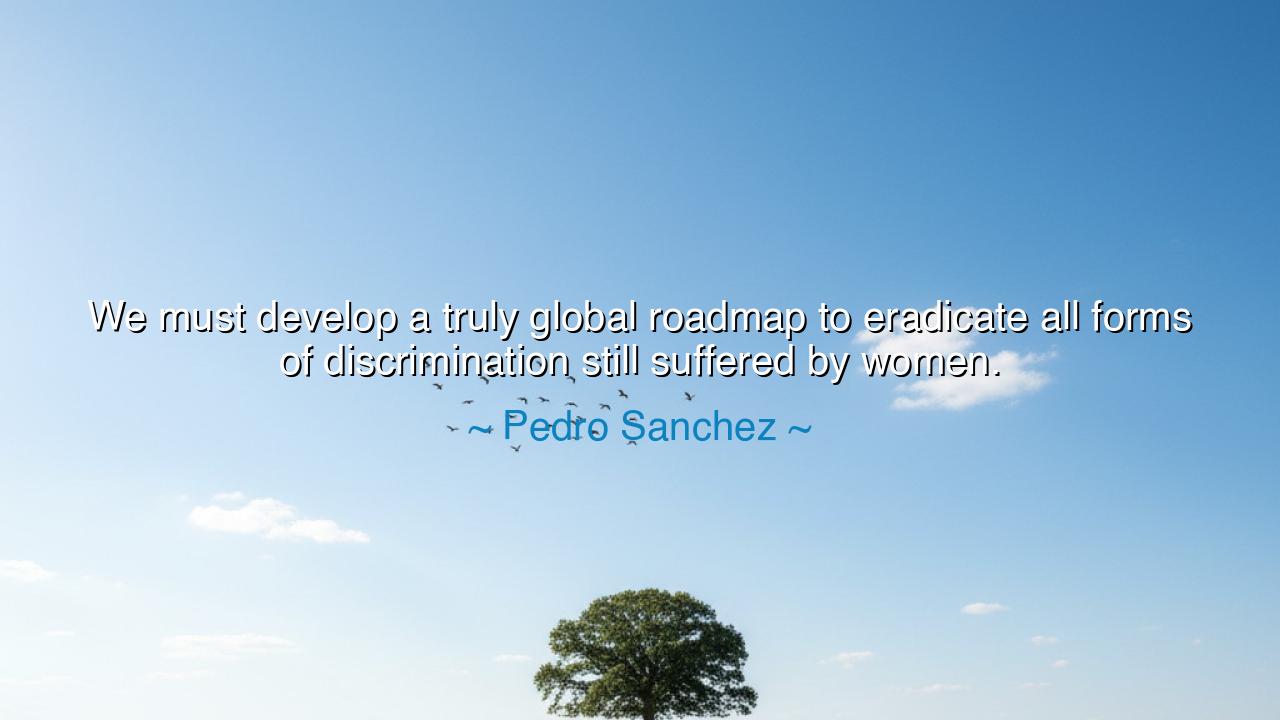
We must develop a truly global roadmap to eradicate all forms of
We must develop a truly global roadmap to eradicate all forms of discrimination still suffered by women.






The words of Pedro Sánchez — “We must develop a truly global roadmap to eradicate all forms of discrimination still suffered by women.” — sound like a call to arms for the conscience of humanity. In them he declares that the struggle against discrimination cannot be confined to one nation or one people, but must be undertaken on the scale of the whole earth. For the wounds inflicted upon women are not local but universal, carried across borders, cultures, and centuries. His words summon leaders and citizens alike to chart a roadmap — not a vague dream, but a deliberate path toward justice.
The meaning of this teaching lies in the recognition that oppression is not scattered, but systemic, woven into the very structures of society. To confront it requires more than speeches and resolutions; it demands a coordinated vision that reaches into law, education, culture, and the daily lives of people everywhere. By calling for a global roadmap, Sánchez acknowledges that partial victories are not enough. True progress is achieved only when every form of discrimination — whether legal, economic, or cultural — is faced and undone.
History offers its witness. Consider the movement for women’s suffrage in the early 20th century. In some nations, women gained the vote while in others they waited decades longer. The struggle was uneven, fragmented, and delayed by the absence of a shared vision. Yet when international voices began to unite, as in the United Nations Declaration on the Elimination of Discrimination Against Women in 1967, momentum grew into a force that crossed oceans. This is the very spirit of Sánchez’s call: to replace isolation with cooperation, to replace fragmented effort with a common march.
The origin of such words lies in the recognition that the fate of women is tied to the fate of humanity itself. Where women suffer injustice, societies stagnate; where they flourish, nations prosper. Sánchez’s vision is not only moral but practical, for a world that denies half its people their dignity cripples its own potential. His roadmap is thus both a demand for justice and a blueprint for prosperity, peace, and the flowering of civilization.
Therefore, O children of tomorrow, carry this command as a sacred trust: do not rest until all forms of discrimination against women are ended. Let every nation, every community, every heart be part of the roadmap that leads to freedom. For the liberation of women is not a gift bestowed by men, but a right long denied. And as Sánchez reminds us, only when the world walks together shall this burden be lifted, and the fullness of humanity revealed.






GHGiang Ha
It’s encouraging to hear world leaders like Pedro Sanchez call for a global effort to tackle gender discrimination. However, I’m curious about the timeline for such a roadmap. How soon can we expect significant progress? Can we measure the success of such initiatives beyond just creating policies, and ensure that real, positive changes are happening on the ground for women facing discrimination?
TTThai Thi Thu Thuy
A truly global roadmap for ending discrimination is a noble idea, but I can't help but wonder if it’s overly optimistic. With all the different economic, political, and social systems in place across the world, how can we ensure that women in all regions will experience tangible change? What frameworks or partnerships need to exist to hold everyone accountable to such a vast and ambitious goal?
TLDo thuy linh
Pedro Sanchez’s words emphasize the need for a global approach to women’s rights, but what happens when governments or organizations are resistant to change? What can be done if there are strong political or religious forces in certain regions that perpetuate discriminatory practices? Should the global community intervene, or does that risk imposing foreign values on sovereign nations?
QALuc Vu Quynh Anh
While I agree with the sentiment behind the quote, I wonder if a universal approach can really be applied to the diverse challenges women face across different regions. In some countries, legal reforms may be enough, but in others, deeply ingrained cultural or societal barriers might require entirely different strategies. Can a one-size-fits-all solution truly work in such a varied landscape?
NVVuong Ngoc Nguyen Vu
This quote calls for an ambitious and comprehensive strategy to eliminate discrimination against women worldwide. But what does 'a truly global roadmap' really mean in practice? How can we ensure that different cultures, governments, and institutions all align on such an important issue? And what actions need to be taken to transform global commitments into concrete, measurable results?